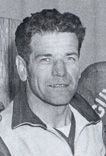 Billy Mathews was a Canadian racer who is best known for his two victories in the Daytona 200. His 1941 win on the beach course at Daytona Beach marked milestones in several respects – it was the first victory by a foreign rider and the first win for a non-American motorcycle (Norton). Mathews came back to win the 200 again in 1950 and became the only rider to win both before and after World War II.
Billy Mathews was a Canadian racer who is best known for his two victories in the Daytona 200. His 1941 win on the beach course at Daytona Beach marked milestones in several respects – it was the first victory by a foreign rider and the first win for a non-American motorcycle (Norton). Mathews came back to win the 200 again in 1950 and became the only rider to win both before and after World War II.
Mathews hailed from Toronto and was known as an all-around racer in Canada. He raced everything from scrambles, to flat track, road racing and even speedway events. His first racing motorcycle was a 1924 Rudge Special that he raced in the early 1930s. Mathews began racing in an era when a rider could race nearly every night of the week and both days on the weekend during the summer months. As he progressed through the ranks, Mathews would leave his Hamilton, Ontario home for months at a time chasing the fair circuit in the United States.
His 1941 victory at Daytona was totally unexpected. The Harley-Davidson and Indian factory efforts were at the race in full force. Harley was debuting its new WRTT model and was riding a three-race winning streak at Daytona.
Mathews took the early lead in the race on his Norton, but crashed in the early going and fell behind the leaders. Fortunately for Mathews, his motorcycle wasn’t damaged and he continued the race. He charged back through the field and worked his way back up to second behind Indian’s Jimmy Kelly.
Kelly looked to have a safe lead, but with just four laps to go his engine quit and Mathews moved ahead and cruised to victory. Despite crashing, Mathews set a new record speed for the 200 averaging 78.08 mph. His Norton Manx's 500cc engine was the smallest to win Daytona to that point.
After World War II, Mathews accepted an invitation to race in Great Britain for a speedway team called the West Ham Hammers for the 1947 season. He returned to Daytona in 1948 and nearly won again. In that race, he battled with Floyd Emde for the lead until having trouble during a pit stop. Mathews had difficulty finding his crew among the crews of the other 154 entries. One of his crew spilled gas while fueling and Mathews had to shut off the Norton. The team had trouble getting the big single restarted on the wet sand and Mathews fell behind.
Towards the end of the race Mathews closed in on the leader Emde. The fans came to their feet in the closing laps. Rarely did they ever get to see riders battling so closely for the lead in the closing stages of the 200. Emde held off the late charge by Mathews, who had to settle for second.
Mathews was part of the Norton sweep of Daytona in 1949. He finished second to rookie Dick Klamfoth. Tex Luse was third on another factory Norton.
Mathews came back to win his second Daytona 200 in 1950, this time besting Norton teammate Klamfoth by one minute and 45 seconds. The 1950 race ended on a humorous note. Mathews took the checkered flag then while celebrating crashed his bike on the sand bank in turn one. Nothing more than Mathews’ pride was damaged in the accident. He became only the second multi-time winner of the Daytona 200, following Ben Campanale.
Mathews gradually faded from the American racing scene during the 1950s, although he kept racing in Canada through the rest of the decade. Later in his career, he concentrated on road racing.
He moved to British Columbia and went to work at Trev Deeley’s Vancouver dealership. Deeley said he remembered Mathews as a fun-loving guy, whom everyone liked. He conveyed a funny story about Mathews. When Deeley was approached by Honda to become a dealer in the late 50s, Deeley said he would have to sample some of the company’s bikes first. Honda sent over a 305cc Dream and Deeley remembers Mathews enthusiastically hopping on the bike and zipping away in heavy downtown Vancouver traffic. Mathews returned some time later pushing the bike with his head down. He had crashed the first Honda in Canada into a car.
Mathews eventually took a job with the British Columbia Department of Highways.
Mathews died of cancer on July 11, 1980. He was 68.
He was inducted into the AMA Motorcycle Hall of Fame in 1998.